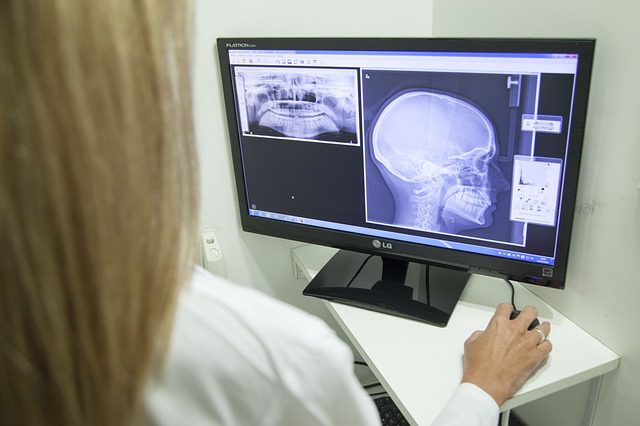Considering the potential applications of artificial intelligence tech is limitless, it was only a matter of time before AI hit the field of oral and maxillofacial medicine. Emerging research seems to indicate that machine learning will be a useful tool for oral surgeons diagnosing particular diseases or deformities. Why’s this particularly interesting to the field of oral health care? A few reasons:
- Machinated analyses of oral structures can detect things the human eye may not see.
- Faster diagnoses means early detection and quicker time to treatment.
- More accurate diagnoses result in more effective treatment plans.
Bite-Size Guide to AI & Machine Learning
So, what exactly is this tech?
Artificial Intelligence (AI)
AI encompasses a broad range of technologies that enable machines to simulate human intelligence, such as learning, reasoning, and problem-solving. AI algorithms are trained on vast amounts of data, allowing them to identify patterns and make predictions that were previously the domain of human experts.
Machine Learning (ML)
Machine learning is a subset of AI that focuses on enabling machines to learn without explicit programming. ML algorithms are trained on data to automatically identify patterns and relationships, enabling them to perform tasks such as image classification, natural language processing, and predictive modeling.
How Can AI Been Applied to Dentistry & Oral Surgery?
Artificial intelligence (AI) and machine learning (ML) are rapidly transforming the field of oral and maxillofacial medicine, bringing advancements in diagnosis, treatment planning, and surgical procedures. There are more than a couple ways AI can improve how oral surgeons practice medicine:
1. Diagnostic Imaging Analysis
AI algorithms can analyze medical images, such as CT scans, MRIs, and panoramic x-rays to detect abnormalities, measure structures and assess disease progression. This can help dentists and maxillofacial surgeons make more accurate diagnoses and identify treatment needs earlier.
2. Facial Reconstruction Planning
For patients with complex facial deformities like pediatric maxillofacial conditions or problems resulting from facial trauma, AI-powered software can assist in virtual surgical planning. Surgeons can reconstruct the patient’s face based on 3D scans, allowing them to optimize dental implant placement, plan osteotomies, and simulate the desired outcome of the oral surgery.
3. Patient Risk Analysis & Prognosis
AI models can analyze patient data and risk factors to predict the likelihood of developing certain oral and maxillofacial diseases or experiencing complications from treatment. This can help oral surgeons provide more targeted preventive care and optimize treatment strategies.
4. Automated Tooth Segmentation & Localization
AI algorithms can automatically detect, segment and localize teeth in dental images, such as radiographs and intraoral scans. This can streamline dental implant surgery, impacted wisdom tooth extractions, and other implant-hybrid procedures like anchored bridges and dentures by reducing potential for errors.
5. Dental Implant Placement Prediction
AI models can analyze patient data, including bone density and jaw structure, to predict the success rate of dental implant placement, osseointegration, and which type of prosthetic tooth structure would be best for the patient. This can help oral surgeons guide patients towards more appropriate implant placements and improve overall success.
6. Personalized Sleep Apnea Assessment
AI-powered software can analyze sleep studies to assess the severity of sleep apnea and identify potential risk factors. This can help dental specialists and maxillofacial surgeons to collaborate with sleep specialists to provide more personalized treatment options for sleep-disordered breathing.
7. Oral Cancer Detection & Diagnosis
AI algorithms can analyze images of oral lesions to identify suspicious areas and assist in early detection of oral cancer. This includes isolating tumors and lesions to improve biopsy and removal procedures. This can improve the overall prognosis for patients with oral cancer or those with pre-cancer symptoms.
8. Virtual Surgical Assistants (VSAs)
AI-powered VSAs can provide real-time guidance and assistance during surgical procedures, assisting oral surgeons with navigation, orientation and decision-making. This can enhance surgical precision and reduce procedure time. This factor may be especially useful for complex procedures that require lengthy stays under anesthesia, as well as for anesthesia-sensitive patients, like those undergoing geriatric or pediatric oral surgery.
What’s the Research Say?
Are we sure AI and machine learning aren’t just the latest tech fad in oral surgery – like those robotic arms from the aughts that doctors were never properly trained on? No way. The academic literature coming out of AI-oral health studies is actually pretty compelling. Three groundbreaking papers recently published:
Machine Learning & Jaw Deformities
A study published in November 2023 asked if machine learning could diagnose jaw deformities better than traditional methods like panoramic x-rays. AI performed on-par with traditional methods when presented with 2D scans, and even better than traditional methods when presented with 3D scans.
AI & Diagnosing Dental Diseases
A preliminary study published in June 2023 asked if an AI model that accurately diagnosed dental diseases when presented panoramic x-rays. They developed a framework and then analyzed its efficacy against dentists with low (<3 years), medium (3-10 years) and high (10+ years) levels of experience using 5 oral diseases as analogs. Overall, the AI program proved similar to or better than dentists with 3-10 years of experience at accurately diagnosing dental diseases.
AI & Early Detection of Gum Disease
A study published in October 2023 asked if AI could accurately detect gingivitis when presented with intraoral photographs. The artificial intelligence was able to determine tissue areas with and without gingivitis-related inflammation, with accuracy and sensitivity above 90% – on par with visual examination by a dentist.
What’s Next in Artificial Intelligence for Oral Surgeons?
It looks like AI and the development of oral-surgery-specific machine learning will serve to streamline treatment while offering new insight into conditions like gum disease and jaw cancer. This would allow dental specialists to focus on co-developing new treatment strategies that include natural and homeopathic treatments. AI can analyze the efficacy and side effects of new treatment methods, ensuring patients remain comfortable and calm before, during and after their oral surgeries.
It may not seem like it, but including AI in practice can make oral surgeries more holistic. Surgeons working in integrative medicine are always looking for ways to provide less invasive procedures that are at the same time (1) more effective and (2) less invasive. The goal is to improve the efficacy of the oral and maxillofacial field at-large, because better oral health on a population level has myriad positive implications for general health of society.
Pretty neat, right?








